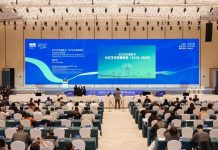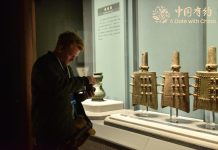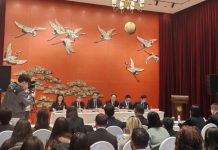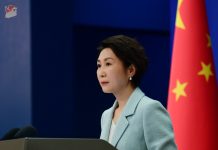This year is the 75th anniversary of the establishment of diplomatic relations between China and Russia, and 2024 and 2025 have been designated as the China-Russia Years of Culture by the leaders of both countries. The Beijing People’s Association for Friendship with Foreign Countries, together with the Russian Culture Center in Beijing and the China Conservatory of Music, used music as a bridge to deepen artistic exchange between the youth of China and Russia, promoting mutual understanding between the two peoples.
Mutual understanding
At the concert, Zhao Yunhong, a professor at the China Conservatory of Music, gave the first performance of the Russian romantic piece Bolero in China, showcasing her exquisite singing skills and heartfelt interpretation, which won enthusiastic applause from the audience.
Zhao graduated from the Moscow State Tchaikovsky Conservatory in Russia. She has performed in numerous concerts in Russia and has been invited to serve as a judge for vocal competitions there. The Russian Musicians journal has hailed her as the “Oriental Nightingale.”
She told Beijing Review that China and Russia have profound and splendid cultural heritage. In modern times, Russia has deeply influenced Chinese culture, especially in the realm of bel canto singing, which was mainly introduced into China from Russia. In the 1950s and 60s, China sent a large number of students to study in the Soviet Union and they made outstanding achievements in various fields after their return. She believes that the friendship between China and Russia is very deep, and the relations between the two countries are becoming closer.
Russian artists also performed in the concert. As one of the busiest performers at the concert, Anton Statienko used the domra to accompany other Russian performers. The domra, in the lute family, is a primary instrument in Russian ensembles, comparable to the violin in Western orchestras, and is indispensable in almost every Russian musical piece.
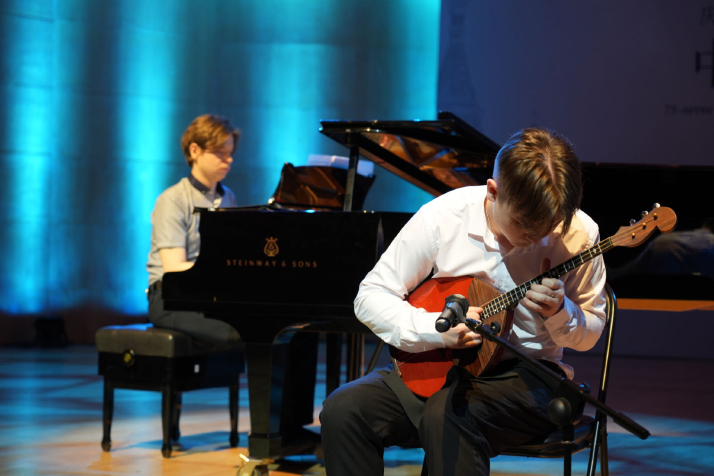
Before the formal performance, Statienko had expressed his desire to perform his favorite pieces, which best represent Russian musical culture, to the Chinese audience, to deepen their understanding of Russian culture.
When introducing the domra to Beijing Review, Statienko also showed great interest in Chinese musical instruments. “The domra has three strings, while the pipa, or Chinese lute, has four strings. I really hope to have the opportunity to perform together with the pipa,” he said.
Talking about his impression of China, Statienko revealed his strong interest and fondness. He had visited the former imperial palace complex in Beijing and developed a great interest in Chinese architecture, cuisine and other cultural aspects. “Beijing has left a deep impression on me. The warm hospitality of the Chinese people has made me feel very warm. I hope to have the opportunity to visit China again,” he said.
Deepening exchange
Music is a cultural symbol of global communication. It can transcend language and cultural barriers, tightly connecting people’s hearts.
Wang Xudong, Secretary of the Communist Party of China Committee of the China Conservatory of Music, said in his speech at the concert that cultural and artistic exchange is an important part of friendly exchange between the two peoples. Russia has a long history and rich cultural heritage. In the 1950s, China systematically introduced the Russian music theory system, and Russia provided important support for the development of music theory research, composition, performance and education in China.
Zhao Jinyan, head of the Department of Europe and Africa at Beijing People’s Association for Friendship with Foreign Countries, told Beijing Review that the Sino-Russian Youth Concert is a platform for mutual trust and exchange between China and Russia through music. She said she believes that cultural exchanges serve to boost cooperation between the two countries in other fields.
The concert allowed the audience to appreciate Russia’s cultural heritage and the remarkable musical proficiency of Russian performers. Strengthening exchange and cooperation between the two countries will contribute to cultural development.
Tatiana Urzhumtseva, head of the Russian Culture Center in Beijing, told Beijing Review that culture plays a significant role in the relationship between the two countries. “Russians may not speak Chinese or recognize Chinese characters, but when they appreciate Chinese paintings and music, they can understand Chinese culture,” she said. She added that in order to break through language barriers, universities in both countries are making teaching each other’s languages a priority, building a smoother bridge for in-depth exchange between the two peoples.
“We have strong partnerships and friendships. China and Russia can mutually assist each other,” Urzhumtseva added.
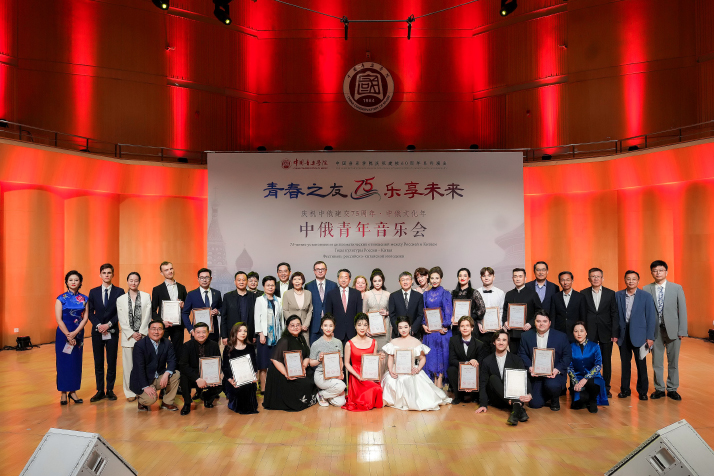
As the concert drew to a close, the popular song Moscow Nights brought a perfect end to this activity of Sino-Russian cultural exchange. However, this marks a new beginning of the bilateral cultural exchange.
Maxim Chernyshev, Cultural Counselor at the Russian Embassy in China, outlined the extensive activities planned under the Years of Culture initiative during his speech. These events will span 51 cities in China and 38 cities in Russia, and include over 30 exhibitions. –The Daily Mail-Beijing Review news exchange item



